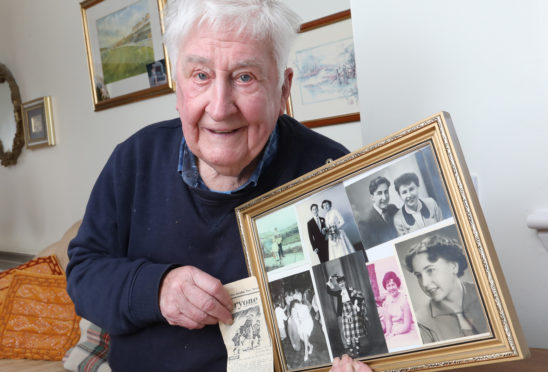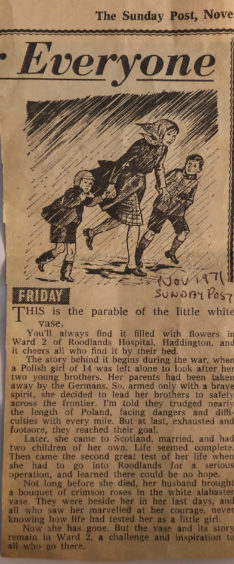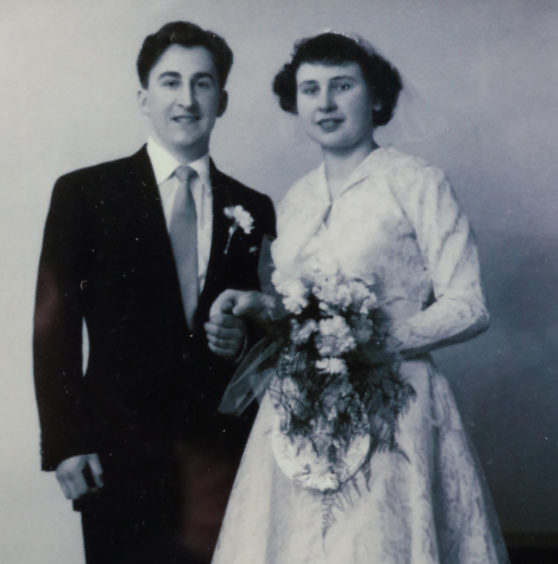
It has, for half a century, been neatly tucked into Tom Wilson’s wallet.
The yellowing cutting, painstakingly snipped from The Sunday Post on November 28, 1971, is only a few hundred words long but, for Tom, it tells a story of life, love, loss. And a simple white vase with red roses.
Written by our famously heart-warming columnist Francis Gay, it tells how visitors to Ward Two of Roodlands General Hospital in Haddington were cheered by seeing a vase that was always full of flowers. It told how the vase had been first brought to the hospital by the husband of a young mum, who wasn’t named, being treated there after falling seriously ill. The column told of her early life, when, then a brave young girl, she was forced to flee her home in Poland as the Russians moved in.
And it told how the flowers were beside her bed in her last days, concluding: “Now she has gone. But the vase and its story remain in Ward Two, a challenge and inspiration to all who go there.”
The woman was, of course, Tom’s wife, Ursula, and it was Tom who brought the vase and flowers to her bedside in her dying days and it was Tom who returned to the hospital for years after her death to fill the vase with red roses in tribute to his beloved, lost wife.
Over the years, Tom would often re-read the 27-line story kept in his wallet, to help him feel closer to Ursula. But, now 90, he felt compelled to contact The Post and fill out his family’s story from almost 50 years ago.
After sending us the treasured cutting, now safely returned, and thanking us for telling his wife’s story, Tom said: “I remember cutting the piece out of the paper all those years ago because I knew it was about her. I read the piece again and again and again. It was something relating to her and I just couldn’t let it go. Now, I want to share Ursula’s story because I’m running out of time – I’m 90 and I thought, ‘Well if I’m going to do it, it better be now’.
“But it was hard to part with because I didn’t know if I would ever get it back again.”
Ursula Seiler, as she was then, was only 15 when she was force to flee Russian occupation in her home of Silesia, located mostly in modern-day Poland, journeying alongside her mother, Elizabeth, and two younger sisters, Gitta and Eleanor.
The family moved first to a Red Cross camp in Dresden and then onto Hamburg, where Ursula finished her studies and later worked for the German postal service. And it was this job that led her to meet a young Scottish soldier, who changed her life.
Tom, who lives in Musselburgh, and is originally from the village of Macmerry in East Lothian, said: “As part of my national service with the Royal Signals, I went to Germany in January 1951. My job was to set up and register new phone lines – the country was in quite a mess then, as you can imagine – and that’s how I met Ursula.
“We got on well right away, so I said to her that when I left the Army, she should come to Scotland for a holiday. When I returned home, we wrote to each other every second night, and then a few years later, in 1954, she came across to test the waters. Three years later, we were married.”
After moving to Scotland and marrying when they were both 27, the young couple went on to have first a son, George, and then a daughter, Patricia. But a shadow fell across Tom and Ursula’s happy life when she was diagnosed with breast cancer aged just 38.
Although Ursula underwent a mastectomy, the cancer had spread and she was to spend her final days in Ward Two of Roodlands General Hospital, with her doting husband visiting every day, one afternoon bringing with him the now infamous white vase, before her death in May 1969.
“When Ursula was diagnosed with cancer, we knew it was going to be a case of having her for days, maybe weeks, but definitely not months,” said Tom, who was a professional football player before working for the local council and as a magistrate.
“I would visit every day and I was always trying to do something to cheer her up. It’s difficult to know what to take with you when you’re visiting every day, so when I saw a white vase in a little shop on the high street in Haddington, I thought she would be pleased with it. So, I took it along with a dozen red roses.
“Then, even after she passed away, I used to occasionally still go up to the Roodlands just to go up to the room where she passed away, and put some more flowers in the vase. I did that off and on for about two years.
“Even now I go to her grave once a week, more if I’m passing by. Although she’s not here, I still feel close to her, and I’m pretty sure we’ll meet up again one day.”
Tom remarried years later, meeting his second wife, Vera, on a business trip to Brighton, but he still carried The Sunday Post story recounting Ursula’s final days with him every day – until posting it back with a thank you letter to Francis Gay.
He said: “When you lose the person nearest and dearest to you, it makes such a difference to your life. There’s nothing you can do about it. I’m 90 now and I know I don’t have much longer, but that doesn’t bother me. I’ve lived my life. I really believe I’ll meet up with her again. It’s just a matter of time.”

Enjoy the convenience of having The Sunday Post delivered as a digital ePaper straight to your smartphone, tablet or computer.
Subscribe for only £5.49 a month and enjoy all the benefits of the printed paper as a digital replica.
Subscribe
